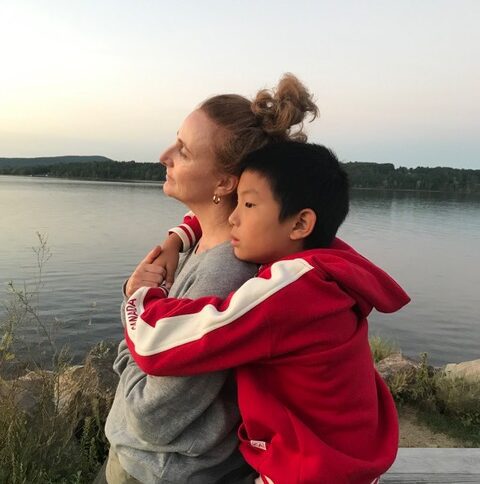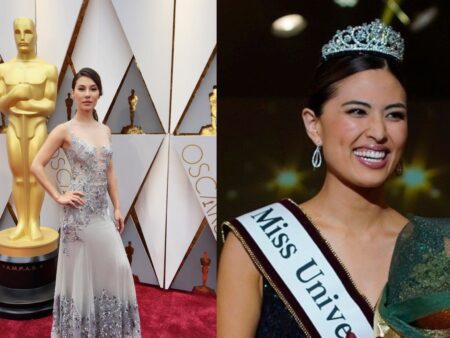
I had never asked myself what I could survive. My first miscarriage, at almost five months, was the moment I knew my life would never be the same. The feeling was powerful. It pulled me apart at the seams and when I glued myself back together, the pieces were skewed and misaligned. One moment our baby’s tiny heart was beating, and the next, that gentle pulsing ceased to exist. It wasn’t just my son that I mourned, but an entire life dreamed up inside my head. I had to bury that as well.
That first miscarriage led to several others. I could get pregnant but was unable to sustain pregnancy for more than a few months. The agony is indescribable. I felt helpless. That’s how I felt about becoming a mother: helpless.
That first miscarriage led to several others. I could get pregnant but was unable to sustain pregnancy for more than a few months. The agony is indescribable. I felt helpless. That’s how I felt about becoming a mother: helpless.
Like any stigma, infertility makes people uncomfortable. They don’t know what to say, so often they say nothing. Or they talk in platitudes: “You’ll try again,” or “You just need to relax.” What I needed was someone to acknowledge my pain, not reduce it to something far too simple.
“You can always adopt” is another suggestion, as if it is the easiest thing in the world. I know that it isn’t. It’s a long, complicated road that will test every ounce of patience and perseverance you thought you had. But I also know it’s worth it, every heart-wrenching minute of it. The waiting is the hardest part. You wait after your name is put on a long list of families hoping to adopt. You wait several years for the phone call that says your name has reached the top of that list. Even more years of waiting are in store as you pray every day for a baby to find its way to you.
Amid all that waiting, is fear. Fear that something might go wrong.
For me, sometimes it seemed that the pressure of all that waiting would squeeze my heart up out of my chest and I would have to swallow hard to push it back down. That kind of waiting takes its toll. It chips away at resilience, it erases the clean edges of optimism and makes them blurry. A distance settles in, a gulf between the life you have and the life you want.
Eventually, though, with enough patience, those life-changing moments arrive. For my husband and I it came after five years. We flew across the world and made our way into a small apartment in Seoul, South Korea, where we met our then 15-month-old son for the first time.
I’ll never forget it.We flew across the world and made our way into a small apartment in Seoul, South Korea, where we met our then 15-month-old son for the first time. I’ll never forget it.
Everything around us was suddenly in sharp focus. We were staring at our son. This is our son. I felt elated, overflowing with emotion. I could hear my heart beating, it pounded so furiously.
Our baby boy stared at us with the same gaze that looked out from the photos we had stashed in our wallets. I didn’t know if I should touch him or hold him. He was surreal, beautiful, divine, perfect.
I wish I could tell you we took him home and began our lives together in the days that followed. But the waiting continued—for a court date in Seoul, for documents to be translated, for lost visas to be found. My husband returned to our home in Montreal, Canada, while I waited for months in Asia for the moment I could hold my child and call him mine.
With adoption, there is no pregnancy to prepare your body and heart for parenthood. No time for a foundation of love to build that slowly gives way to the moment your child is placed in your arms. With adoption, the transition to parenting is abrupt—from uncertainty and hope to the indescribable moment when a child’s hand is holding yours. And just like that, you are a mother or a father.
Yet, to him I was a stranger. When the door of our hotel room shut and the lock clicked into place, my son was like an animal caught in a trap. He looked around frantically for an exit, and when he realized there was none, began sobbing uncontrollably.
He did not stop for two full days.
I held my weeping baby in my arms for hours on end as he mourned what had been precious to him: his life, the foster parents who had been caring for him. He was suffering a tear in the fabric of everything he knew. It was heartbreaking to watch one so young grieve with such overwhelming emotion. I had been told to expect this reaction, but nothing could have prepared me for the depth of his distress. He ran to the door of our room and banged on it with his fists, desperate to escape back to the world that he knew. When that didn’t work, he banged on the door with his head. It was almost as if he understood the rupture was permanent, and was utterly unable to cope with the suffering it brought.
It broke my heart. Down on my knees, I crawled as close to him as he allowed, desperate to help in any way I could. I would have done anything to take away his heartache, to make his burden mine. But it was his to carry, even at his tender age. With tears pouring down his face, two streams of rushing water, he fought it for as long as he could before throwing himself into my arms. I held him to me tightly while he just cried and cried. It was only when the sun went down, that he collapsed into sleep. When he woke, though, and came face to face again with his new reality, fear attacked quickly, violently, and he broke down once again into relentless weeping.
We were both exhausted, but I had never felt so inexplicably powerful in my life. My entire being felt devoted to this one task of caring for him. I was awake in my very core. This child, only fifteen months old, felt alone in the world, and I was the only person he had to help him find his way. It took endless hours of compassion and empathy to soothe him. It was the start of our relationship and tough as that beginning was, we were creating a bond of tenderness and trust. I held him, fed him, bathed him, and wiped him down with a soft cloth. I comforted him and worked on making him feel safe again. I slept by his side. I sang to him. I loved him.
Other than brief video chats with my husband, I spoke to no one else. For five long days, the door to our hotel did not open once. It’s called cocooning—keeping your newly adopted baby away from other people and the outside world to encourage attachment at every level. To make sure that child will come to you when he needs comfort, food, or care. Those who care for us when we feel alone become our lifelines, and this is what needs to be cultivated in a new baby, in order to create a bond first of need, then of love.
My son and I stayed there together in Seoul, the days melting into nights, the world outside inaccessible to us both. We clung to each other, growing together like vines in search of sun. Watching him struggle and bearing witness to the strength he found to live through his anguish was the most extraordinary experience of my life.
Slowly, came sweet smiles, gentle cuddling and nights spent curled together. My little boy’s memories were fading, settling into a place where they didn’t frighten him. It was just the two of us, and we needed each other. Life changed profoundly for us both. He began holding onto me, touching my cheeks, exploring my face with his eyes. He held my hand as he fell asleep, making sure I would be there when he woke. I never left his side. We had made it through the dark, out of that dreadful place. Through indescribable sorrow, my darling boy found what he needed to move on—love.
It has been nine years since those first precious moments. And I can tell you this—my beautiful son helped me heal. Adoption is a labor of the soul. You take a great breath and then exhale minute by minute, day by day, year after year, until a tiny precious being is placed in your hands asking to be cherished. Our son has given us more than I can ever possibly put into words. When I feel him pressed against me, there is simply nowhere else in the world I would rather be. When I tuck him in at night, and he places his palm on my cheek, I stare at him, refusing to blink because I don’t want to miss a single second.
My beautiful son helped me heal. Adoption is a labor of the soul. You take a great breath and then exhale minute by minute, day by day, year after year, until a tiny precious being is placed in your hands asking to be cherished. Our son has given us more than I can ever possibly put into words.
He inspires me to be better in every possible way. His journey reminds me not to be afraid. I know that every step it has taken to get here, all those years of waiting, every heartbreak and disappointment, every piece of me that had been broken and put back together, has been worth it.
After my miscarriages, when the idea of motherhood had begun to fade, I began to ask questions of myself, knowing I had to choose between giving up and fighting on, between fear and faith, between doubt and belief. In the end, we persevered and found that time and love can heal. But even with my sweet baby by my side, scars remain. It has taken me so long to accept who I have become through it all. I am comfortable with my scars now. They don’t frighten me anymore because they are not all I see.
Whether your baby comes from your body after struggling with infertility, or from a donor egg, a surrogate, or an adoption, it’s the journey to become a mother that defines us. Those who haven’t had the struggle can’t know the pain or understand the heartbreak of what it took to get there. But the more we talk about it, our voices can help shed the shame and the silence that has felt intertwined with infertility. We can instead celebrate the incredible resilience it took to fight for our children, and cherish each precious day since their arrival.
Contributor
Tarah Schwartz
Tarah Schwartz was a reporter and news anchor for CTV Television for more than 20 years, and is the author of Can’t Help Falling: A Long Road to Motherhood. She won four Canadian journalism awards and was named a woman of influence by Na’amat Canada. She is the Communications and Marketing Director for MUHC Foundation and lives in Montreal with her husband Enrico, son Sam, and cat Milo.

Listen to stories, share your own, and get feedback from the community.


















